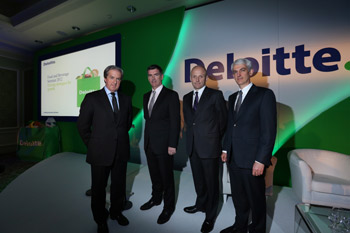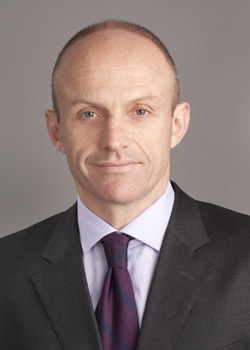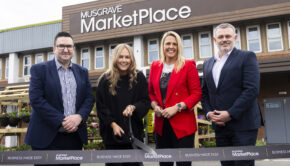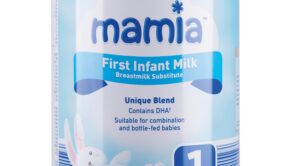Predictions of growth for Irish food and beverages

The recent Deloitte Food and Beverage Seminar entitled ‘Driving strategies for growth’ focused on the opportunities and challenges that facing the Irish food industry
11 May 2012
While optimism and positivity were the preferred sentiments of the day, speakers at the Deloitte Seminar also emphasised the continued challenges facing the Irish food and beverage industry. Speakers included Ado Carton, managing director of Kerry Foods, Aidan Cotter, CEO of Bord Bia and Tony Keohane, CEO, Tesco Ireland.
Moderator Jim Power, chairperson of Love Irish Food and owner manager of Jim Power Economics Limited, opened the show by proclaiming that these were incredibly exciting times for Ireland’s agri-food sector. He said that following the Irish agri-food delegation to China the previous week, he was “giddy with anticipation” at the prospects that lay ahead.
He spoke of the targets in place for the food industry outlined in Food Harvest 2020, a report detailing the next decade of our agri-food, drinks, fisheries and forestry sector launched by the government in 2010 and how challenging they would be due to grocery spending being down by 2.6%.
The Minister for Agriculture, Food and Marine, Simon Coveney, made an inspirational speech about the enormous potential in the Irish food industry. He was followed by David Hearn, a management consultant for Deloitte who outlined the results of a survey undertaken by the delegates, to try to understand how those in business viewed the economy. Following this Aidan Cotter from Bord Bia discussed how the world’s population is growing and how we have the potential to extract considerably more from our food industry to take advantage of this. Both Tony Keohane of Tesco and Ado Carton of Kerry Foods explained the intricacies of their businesses and how they have transformed them to suit the changing environment.
Deloitte survey results
David Hearn took to the stage to reveal the results of the survey. He commented: “Irish food and beverage companies are still facing a very challenging market in Ireland but it’s extremely encouraging that companies are seeing growth in overseas markets.”
He said that it was extremely promising that despite the challenging marketplace, 95% of respondents stated that they are continuing to invest in their businesses. The main areas of focus for this investment include improving efficiency, sales and marketing, people, R&D and expanding overseas. He said: “This investment will be critical to ensure that companies are well positioned to take advantage of the opportunities that international markets offer, in addition to those here in the Irish market."
Results of survey
Attendees at the Deloitte Food & Beverage event completed the survey. Respondents were from a mix of retail, consumer products and manufacturing companies
· The biggest challenges facing food and beverage companies in Ireland include the high cost of doing business, as identified by 28% of respondents, consumer demand (21%) and consumer price sensitivity (20%). Other issues include the availability of credit, high taxes and the regulatory burden
· Nine out of 10 companies are continuing to invest in their businesses
· Just over half of food and beverage companies in Ireland have observed improvements in the export market in the last 12 months with the UK, the rest of Europe and China the top three geographic areas.
· In terms of the overall economy, one third of respondents believe that it will be the second half of 2013 before the economy returns to growth.
· Improving consumer sentiment was identified as the most important factor in returning the economy to growth, followed by restoring Ireland’s competitiveness and reducing unemployment.
Ambitious plans for growth
Minister Coveney explained how the Irish population is growing and “urbanising”. This will increase pressure on energy and water use in the future. With changes in diets and incomes the food industry needs to look ahead and plan for this. This growth demands a shift from carbohydrate to protein based diets and he said we produce these products better than anyone in the world. “We are targeting higher end premium markets for our exports and this is a driver for growth.”
The Minister predicts a huge growth for our seafood sector, up to 700%, in the next 10 years. “We can sell salmon for 40% more than other places like Chile and Norway because it’s seen as being so good here. We employ between 300/400 people in the fishing industry but we will eventually employ between 2,000/4,000 in rural Ireland. This is a multi-million euro industry that is being developed,” he said.
Speaking about the dairy sector he predicts approximately 43% growth between now and 2019. He said that Ireland is trusted as being “clean and green”.
The possibilities of growth though the Chinese market were much discussed throughout the seminar and Coveney said that this market represents a huge opportunity for Ireland. He said: “China wants what we have – safe, consistent produce. Chinese consumers are nervous about their own home-grown produce so they look for foreign-based labels. Families only have one child so they spend a huge amount of disposable income on that child. Middle class children in urban China are spoiled.” He said that there was a vast market for infant formula and dairy produce in particular. “Our development needs to be targeted. We need to restructure our industry. The Irish label should be seen as a little bit special.”
A great sign for growth in the industry is the 100% increase in students studying agri-food and farming in recent years. “We are at the start of a journey. We want to position Ireland as the food island internationally.
“It’s going to become more and more difficult to feed the world. We need to exploit our natural resources. We produce enough food for about 35 million people but by 2020 it will be 50 million if not more.”
Speaking about the Common Agricultural Policy (CAP) he explained that it is at a crucial stage of reform. “85% of all funds that come into Ireland are from CAP. The agreed budget will happen in first half of next year when we have the presidency of the EU. There needs to be a redistribution of funds because of new member states.”
Bord Bia urges the food industry to prepare for growth

Aidan Cotter, CEO, Bord Bia
World food commodity prices are seeing a clear upward trajectory, according to Aidan Cotter. He explained that the world’s population has reached 7 billion and by 2050 it will be 9 billion. “All of the growth is in places where incomes are also rising,” he said. “Around 3 billion will join the middle classes in the next 20 years because standards of living are rising in places like India and China. This is China’s decade.”
We need to be ready for an increased frequency of weather volatility which will cause commodities to rise and fall. Water is an increasingly important commodity and two out of three people will live in regions with water pressures. Competing use of land for fuel as well as food, will add to challenges ahead.
Considering all of this, he believes that Ireland is in a strong position. “The prepared foods, beverages and seafood sector has limitless potential. Look at patterns across the world. Exports grew by 12% or EUR*1 billion last year.”
Speaking about Food Harvest 2020 he said exports should rise from EUR*5 billion to EUR*12 billion by 2020.
Low confidence at the end of the Celtic tiger years meant that the industry hadn’t been as attractive so we weren’t attracting talent or policy makers’ attention. Cotter said that this has to change. “We need to demonstrate our green credentials. We are in the ideal location for producing high quality food. It is no longer good enough to describe ourselves as being green – we need to prove it.”
He described initiatives devised by Bord Bia such as Pathways for Growth which encourages companies to work together abroad. He said that collaborations between the likes of Cashel Blue cheese and Kerrygold in the US brought benefits to both brands as it helped Kerrygold grow its portfolio and Cashel Blue benefited from its affiliation with a well-known brand like Kerrygold.
He also mentioned Bord Bia Marketplace which took place earlier this year, facilitating 4,500 meetings over one day.
Tesco’s response to a changing economy
Tony Keohane is sick of the negativity and says it’s time to talk about opportunity and growth. “Yes we have austerity but I am optimistic about the future and glad others are outlining the optimism,” he said.
Keohane said that Tesco employs 15,000 people between stores, distribution and head office in Ireland and it is among the largest private employers in the country with sales of EUR*3 billion. With 127 stores, it holds a 28.2% share of the Irish market, according to Kantar Worldpanel. The retailer is growing through the convenience channel here with 25 express stores open over the past three years.
While households are spending EUR*500 less on groceries a year than they were in 2008, Keohane spoke about how the company has responded to this. “We radically changed how we did business. Trolleys weren’t full and they were going across the border. We did something about that. Our ‘Change for Good’ promotion was a structural change. It was painful and difficult to alter our supply chain but it had significant effects. It made other retailers follow suit.
“Our world revolves around consumers. You have to keep the customer on your shoulder for every decision you make,” he said.
Tesco is seeing considerable growth in own brand products and Keohane pointed out that the perception of own brand being lower quality is of the past. “We have over 100 Irish companies producing our 4,000 own brand products. For example Lir Chocolates produces Tesco Finest Easter Eggs and Irish Yoghurts supplies our own brand yoghurts.”
He said the next challenge for the industry was to respond to the surge in online use. “71% of consumers will have smart phones by end of this year. There will be a huge shift in the way consumers are reacting with retailers. They are relying on the mix of the physical store and online. Our online is growing by 20% a year.”
Driving production through research at Kerry Foods

Ado Carton, managing director, Kerry Foods
Ado Carton said that he would rather look at the current climate as different as opposed to difficult, rowing in with the positive vibe of the seminar.
Kerry Foods is the consumer foods division of Kerry Group and produces brands such as Dairygold, Charleville, Cheestrings and a host of meats including Denny, Galtee and Shaws. It also produces ready meals.
Carton said that the Kerry model had to go through a major change to be fit for purpose. He said that Kerry Foods was similar to other businesses at the start of the recession in that they were initially in denial, which led to acceptance and then action.
“We needed new consumer insight,” he said. “So over two years ago we engaged in total business restructuring, which resulted in our world class manufacturing model.”
The company took its inspiration from Japanese motor firm Toyota. Carton said: “In 2008 we began to explore the lean concept. In 2009 key decisions were taken”. The company identified an urgent need to reduce its cost base and introduce world class manufacturing processes. The benefits were an increase in production from 1 million to 1.45 million meals per week without one extra metre of floor capacity.
Last year the company identified that 56% of its customers were worried that ham was too processed. In reaction to this it has produced a new product, Denny 100% Natural. Three months after the launch, sales are up and the company is seeing lapsed consumers coming back to the category. Carton said: “Embrace the change. Don’t fight it. As leaders we need to take risks and make investments in things we believe in.”



 Print
Print






Fans 0
Followers